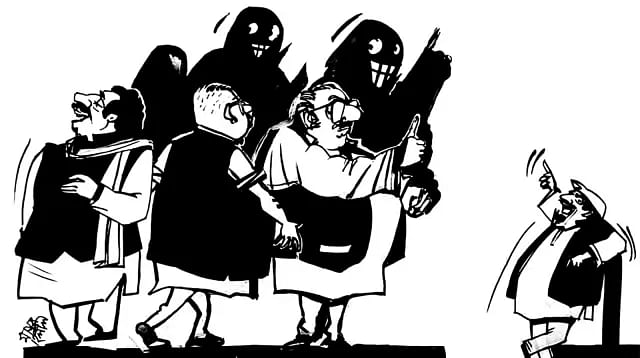
Ever since the independence of Bangladesh, Awami League has always been in the driver’s seat of politics, whether in power or not. It had been in power for almost four years after independence. Then after the change of the political scene in 1975, it remained in the opposition for 21 years. Even then it had politics in its control.
As the political opposition, Awami League never gave any of the governments a moment of peace, always on the streets in movements and struggles. It would bring to the forefront people’s hopes and aspirations, their demands. This is evident in the records of the second, third, fifth and eighth Jatiya Sangsad or national parliament. There were also rallies on the streets. Awami League was in power during the seventh, ninth and tenth Jatiya Sangsad and so had complete control inside the House and outside.
Even since the eleventh Jatiya Sangsad, however, Awami League’s control on politics began to falter. The government and Awami League are not one and the same. The government moves ahead with the administration, the bureaucrats, RAB, BGB, police and so on. The party moves with its leaders and activists.
Awami League was in power before the 2018 election and came to power against after the polls. Many leaders of the party boast that for the first time since 1975, Awami League has had the chance to sit alone at the helm of power. Whether this is a blessing or a burden, is a matter of debate.
It was leaders and activists of Awami League and its affiliated front that were arrested during the crackdown on casinos in September-October last year. The mainstream leaders of the party were flabbergasted. These arrested persons had only recently been presenting them with garlands and bouquets. Many of them said that they were totally unaware of any such operation. Once the operation was in full swing, they were quick to condemn the criminal activities and avow that no one would be allowed to get away with corruption.
Obviously, not everyone was caught, as in evident of the scams run by Shahed and Ariful. If the operation hadn’t halted then, perhaps these fraud gangs would not have got the courage for such blatant scams.
It is even more shocking that whoever is being caught, whether businesspersons, physicians, hospital owners or members or parliament, they are all somehow or the other connected to the ruling party. Awami League leaders are unwilling to take any liability for the misdeeds of Regent Hospital’s owner Shahed and claim he was not on any Awami League committee. How come they made no protest when he would feature regularly on TV talk shows, claiming to be a member of the party’s international affairs committee and to be more of an Awami Leaguer than even Obaidul Quader? There was a silent assent to his assertions.
The statements made by the health minister Zahid Maleque to avoid blame for the agreement signed between the health directorate and Regent Hospital, are nothing short of ridiculous. He said that there are many agreements, the minister’s don’t read them all.
Now the Awami League leaders are taking credit for Md Shahed’s being nabbed on charges of forging COVID-19 test results. They say that it is the government that caught the fraudulence of Shahed, Ariful, Sabrina and others. They made similar claims before, about Samrat, Papiya and others.
When the Awami League leaders make such claims, they should then answer at least two questions. One, how had these criminal cheaters been carrying out their misdeeds and machinations for so long? Two, who were helping them in their unscrupulous actions?
Back to the party. Awami League may be ruling the country with full power, but it has lost its grip on politics. That is no secret anymore. From the senior secretary in the secretariat to the officer-in-charge (OC) at the police station, all have made this more than apparent. They are well aware of how the 2018 election was held, how the ministers and members of parliament were elected.
AL would accuse BNP of rigging the referendum, controlling the elections and politicising the administration. Their accusations were not unfounded. Now BNP is bringing about identical allegations against AL and AL does not have any answers. For the ruling party, this is a moral and political defeat.
There had been a time when Awami League controlled politics on the basis of certain ideology. This was about democracy, people’s right to vote and social justice. This was a reflection of the spirit of the Liberation War. But that ideological base became shaky after the 2018 election.
After the 2014 election, Awami League leaders would say that BNP had missed the train by boycotting the election. But BNP took part in the 2018 election even though the circumstances were even more adverse. However, Awami League failed to uphold the voting rights of the people. So now Awami League too is being criticised for coming to power through stolen votes.
In a parliament of 350 members, BNP has only 8 seats. And the Awami League stalwart parliamentarians are having a hard time responding to the questions of at least two of the BNP MPs – Harounur Rashid and Rumeen Farhana. Interestingly, in the past Awami League always had an aggressive attitude on any issue, BNP was on the defensive. Now, Awami League almost every day is having to answer to BNP and come up with excuses and explanations.
The opposition can be silenced with the threat of cases. The media’ voice can be curbed with the digital security act. But no law, no case and no threat can silence the voices of the common people.
All these days Awami League would accuse BNP of rigging the referendum, controlling the elections and politicising the administration. Their accusations were not unfounded. But now BNP is bringing about the identical allegations against Awami League and Awami League does not seem to have any answers. For the ruling party, this is a moral and political defeat.
Sohrab Hassan is Prothom Alo’s joint editor and a poet. He may be contacted at sohrabhassan55@gmail.com. This opinion piece appeared n the online and print editions of Prothom Alo and has been rewritten in English by Ayesha Kabir.









